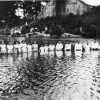calsfoundation@cals.org
Ebenezer Lee (E. L.) Compere (1833–1895)
Ebenezer Lee (E. L.) Compere was the son of pioneer Baptist missionary Lee Compere, who came to Arkansas between 1850 and 1860 because E. L. and brother Thomas H. pastored Baptist churches in western Arkansas. The elder Compere had previously been a missionary in the Creek Nation, having come from England to Jamaica and then the United States with wife Susannah Voysey Compere to do missionary work.
E. L. Compere was born on February 6, 1833, near Montgomery, Alabama, shortly before his family moved from Alabama to Mississippi. On July 23, 1849, he was baptized at Montaches Creek Baptist Church in Itawamba County, Mississippi, and in 1852 was called to preach. From 1852 to 1857, Compere was educated at Mercer and then Mississippi College at Clinton, Mississippi. He graduated from the latter in 1857, declining an offer to take a professor’s position and assuming the pastorate of three churches in eastern Mississippi instead, where he was ordained in March 1858 at old Monte Vallo Baptist Church in Columbus.
In 1858, E. L. Compere visited his brother Thomas in western Arkansas and became concerned about the religious well-being of settlers there and in Indian Territory. In 1859, he resigned his positions in Mississippi and set out to do pastoral and missionary work in Arkansas, turning down a salary of $1,200 per year though he had no secure employment yet in Arkansas.
As Compere made the move to Arkansas, he was completing an MA degree at Mississippi College, earning it in 1860. In March 1860, he assumed the pastorate of the Baptist church at Fort Smith (Sebastian County) and also began pastoring a church at Dardanelle (Yell County), where his brother Thomas had previously served. He divided his time between the two churches, giving the remainder of his pastoral time ministering where churches had not been established. At the same time, he worked as an agent for the Mississippi Baptist publication. In 1861, the Executive Committee of the Cherokee Baptist Convention appointed Compere a missionary, offering him a salary of $500 per year. He accepted the offer on condition that he could still give time to his church at Fort Smith while engaging in missionary work in western Arkansas and Indian Territory.
On December 13, 1863, Compere married Josephine Isabella Mullins, daughter of William Mullins and Sarah Granberry Mullins of Copiah County, Mississippi. They had nine children, two of whom, William Lee Compere and James Seth Compere, became Baptist ministers.
On June 15, 1864, E. L. Compere was appointed chaplain to the Second Arkansas Confederate Regiment, Cherokee Mounted Volunteers, having left his Fort Smith pastorate to take this position. He and his father served together as chaplains under General Stand Watie, the only full-blooded Native American Confederate officer.
On January 1, 1866, the Southern Baptist Board of Missions commissioned Compere to preach in Fort Smith. In March 1866, Compere and his family settled at Charleston (Franklin County), where he carried on missionary work and pastored the Missionary Baptist Church of Charleston, a church his brother Thomas had previously served. Working at Charleston until 1878, he continued giving part of his pastoral time to the Home Mission Board for work among the Cherokee and Choctaw tribes.
In 1876, Compere helped to organize the Baptist General Association of West Arkansas and Indian Territory, being elected the association’s first moderator. From 1877 to 1885, he lived at Witcherville (Sebastian County) and, with Henry F. Buckner, collaborated to set up Buckner College there. The school was chartered in 1879 and opened in September 1882, the first Baptist college in Arkansas.
In 1883, the Southern Baptist Home Mission Board charged Compere to preach in western Arkansas. He served eleven years as the board’s foreign mission secretary. In 1885, Compere and his wife moved to Dallas (Polk County), as his health had begun to fail due to overwork in his missionary and pastoral endeavors.
Compere died on November 27, 1895, in Dallas and was initially buried there. His body was later moved to White Oak Cemetery at Mena (Polk County), where his wife, Josephine, who died in 1937, was buried. Shortly before his death, E. L. Compere published a brief monograph detailing his work as a missionary, titled Indian Missions for the Five Great Southern Tribes.
Collections of E. L. Compere’s papers are held by the Southern Baptist Historical Library and Archives in Nashville, Tennessee, and by the Arkansas State Archives.
For additional information:
Boykin, Samuel. History of the Baptist Denomination in Georgia, Vol. 1. Atlanta: James B. Harrison and Co., 1881.
Compere, E. L. Indian Missions for the Five Great Southern Tribes. Baltimore: Maryland Baptist Mission Rooms, 1895.
E. L. Compere Papers. Arkansas State Archives, Little Rock, Arkansas. http://archives.arkansas.gov/research/browse-archival-collections.aspx?id=2139 (accessed January 24, 2020).
Ebenezer Lee Compere Papers. Southern Baptist Historical Library and Archives, Nashville, Tennessee. http://www.sbhla.org/downloads/2.pdf (accessed January 24, 2020).
Goodspeed’s History of Benton, Washington, Carroll, Madison, Crawford, Franklin, and Sebastian Counties, Arkansas. Chicago: Goodspeed Publishing Co., 1889.
Herndon, Dallas T. Centennial History of Arkansas. Vol. 3. Chicago: S. J. Clarke, 1922.
Hickerson, Amy Compere. The Westward Way. Atlanta: Home Mission Board, 1945.
Pipkin, Jane Compere. “E. L. Compere, Border Missionary.” Unpublished typescript (1944) in Pipkin Family Narratives, Special Collections. University of Arkansas Libraries, Fayetteville, Arkansas.
Taylor, Oliver W. “Arkansas.” In Religion in the Southern States: An Historical Study, edited by Samuel S. Hill. Macon: Mercer University Press, 1983.
William D. Lindsey
Little Rock, Arkansas
 Civil War through Reconstruction, 1861 through 1874
Civil War through Reconstruction, 1861 through 1874 Religion
Religion




Comments
No comments on this entry yet.